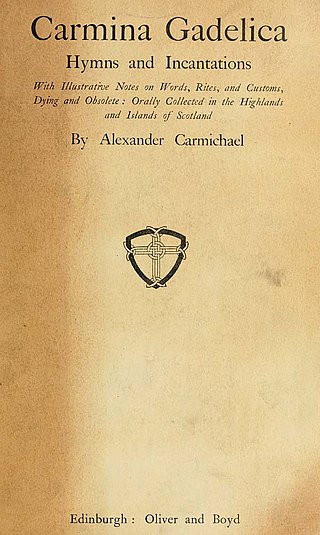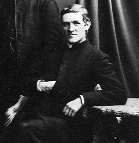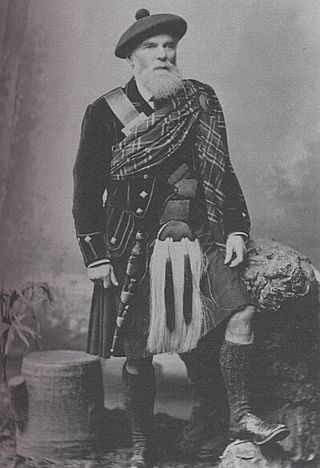Catherine-Ann MacPhee is a Scottish Gaelic singer from Barra in the Hebrides, now resident in Canada. She has worked in the theatre and broadcasting as well as giving musical performances in Scotland, England, Canada and elsewhere. After a period living in Ottawa she moved to Halifax, Nova Scotia, in 2017.
Alasdair mac Mhaighstir Alasdair, legal name Alexander MacDonald, or, in Gaelic Alasdair MacDhòmhnaill, was a Scottish war poet, satirist, lexicographer, political writer and memoirist. The poet's Gaelic name means "Alasdair, son of the Reverend Alasdair". His father, also named Alasdair, was known as Maighstir Alasdair which was then the way of referring to a clergyman in Scottish Gaelic. In English, Maighstir Alasdair was known as the "Reverend Alexander MacDonald".
Pibroch, piobaireachd or ceòl mòr is an art music genre associated primarily with the Scottish Highlands that is characterised by extended compositions with a melodic theme and elaborate formal variations. Strictly meaning "piping" in Scottish Gaelic, piobaireachd has for some four centuries been music of the Great Highland Bagpipe. Music of a similar nature, pre-dating the adoption of the Highland pipes, has historically been played on the wire-strung Gaelic harp and later on the Scottish fiddle, and this form is undergoing a revival.

Carmina Gadelica is a compendium of prayers, hymns, charms, incantations, blessings, literary-folkloric poems and songs, proverbs, lexical items, historical anecdotes, natural history observations, and miscellaneous lore gathered in the Gaelic-speaking regions of Scotland between 1860 and 1909. The material was recorded, translated, and reworked by the exciseman and folklorist Alexander Carmichael (1832–1912).
John MacDonald, known as Iain Lom was a Scottish Gaelic poet.
"Mairi's Wedding" is a Scottish folk song originally written in Gaelic by John Roderick Bannerman (1865–1938) for Mary C. MacNiven (1905–1997) on the occasion of her winning the gold medal at the National Mòd in 1934. In 1959, James B. Cosh devised a Scottish country dance to the tune, which is 40 bars, in reel time.
Dr John Lorne Campbell FRSE LLD OBE (1906–1996) was a Scottish historian, farmer, environmentalist and folklorist, and recognized scholar of both Celtic studies and Scottish Gaelic literature.

Ùr-sgeul was an independent publisher of new Scottish Gaelic prose. The name Ùr-sgeul is a Gaelic word which translates variously as: a romance, a novel or a recent tale. Professor Alan Riach, in Scottish Literature: An introduction, summarises the Ùr-Sgeul publishing initiative as "devoted to prose fiction and developing an increasingly impressive list of new titles: short stories and anthologies but mainly single-author novels."
George Henderson was a scholar of Scottish Gaelic.
Scottish Gaelic literature refers to literary works composed in the Scottish Gaelic language, which is, like Irish and Manx, a member of the Goidelic branch of Celtic languages. Gaelic literature was also composed in Gàidhealtachd communities throughout the global Scottish diaspora where the language has been and is still spoken.

Father Allan MacDonald was a Roman Catholic priest, radically innovative poet in the Scottish Gaelic language, folklorist, and activist for Crofter's rights, free elections, and against religious discrimination in the Gàidhealtachd.
The New Testament was first published in Scottish Gaelic in 1767 and the whole Bible was first published in 1801. Prior to these, Gaels in Scotland had used translations into Irish.
James MacLagan or McLagan was a Church of Scotland minister and collector of Scottish Gaelic poetry and song. His manuscript collection, known as the McLagan Collection, comprises some 250 manuscripts of primarily Gaelic song and poetry collected in the second half of the eighteenth century. The collection includes works by many of the best-known 17th- and 18th-century Gaelic poets such as Iain Lom, Màiri nighean Alasdair Ruaidh and Alasdair mac Mhaighstir Alasdair.

CLÀR is a Scottish Gaelic publisher. Established in 1996, the company is run on a voluntary, independent basis and based in Inverness, Scotland. It was the publisher for the Ùr-sgeul project, specialising in new Gaelic fiction.

Poetry of Scotland includes all forms of verse written in Brythonic, Latin, Scottish Gaelic, Scots, French, English and Esperanto and any language in which poetry has been written within the boundaries of modern Scotland, or by Scottish people.
Màiri nighean Alasdair Ruaidh (c.1615–c.1707), also known as Mary Macleod, was a Scottish Gaelic poet.

Mary Mackellar was a prominent Highland Scottish poet, Scottish Gaelic-English translator and campaigner for the Gaelic language and culture of the 19th century.
Iain Mac Fhearchair (1693-–1779) was a Scottish Gaelic-speaking Bard and seanchaidh "who lived and died in the island of North Uist." Later in his life, Iain served as the official poet to the Chief of Clan MacDonald of Sleat.
Mary MacPherson, known as Màiri Mhòr nan Òran or simply Màiri Mhòr, was a Scottish Gaelic poet from the Isle of Skye, whose work focused on the Highland Clearances and the land struggle. Although she could read her own work when written she could not write it in Gaelic. She retained her songs and poems in her memory until others wrote them down for publication. She often referred to herself as Màiri Nighean Iain Bhàin, the name by which she would have been known in the Skye of her childhood.

John Murdoch was a Scottish newspaper owner and editor and land reform campaigner who played a significant part in the campaign for crofters rights in the late 19th century







